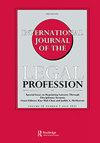Government lawyers: technicians, policy shapers and organisational brakes
IF 0.9
Q2 LAW
International Journal of the Legal Profession
Pub Date : 2021-01-02
DOI:10.1080/09695958.2021.1877715
引用次数: 1
Abstract
ABSTRACT Government lawyers have been rather neglected by scholars interested in the workings of the legal profession and the role of professional groups in contemporary society. This is surprising given the potential for them to influence the internal workings of an increasingly legalistic and centralised state. This article aims to partly fill this gap by looking at the way that lawyers employed by the government and the administrators they work with talk about their jobs. It draws on the findings of a large-scale empirical study of government lawyers in seven departments, funded by the ESRC and undertaken by Philip Lewis between 2002–2003. By looking at lawyers in bureaucracies the interviews conducted revealed much about the work that government lawyers do, their relationship with other civil servants and the subtle influences on policy that they are able to exert.政府律师:技术人员、政策制定者和组织制动器
政府律师一直被关注法律职业运作和职业群体在当代社会中的作用的学者所忽视。考虑到他们有可能影响一个日益法制化和中央集权的国家的内部运作,这令人惊讶。本文旨在通过观察政府雇佣的律师和与他们共事的行政人员谈论工作的方式,部分填补这一空白。它借鉴了2002年至2003年间由ESRC资助、Philip Lewis对七个部门的政府律师进行的大规模实证研究的结果。通过观察官僚机构中的律师,所进行的采访揭示了政府律师所做的工作、他们与其他公务员的关系以及他们能够对政策施加的微妙影响。
本文章由计算机程序翻译,如有差异,请以英文原文为准。
求助全文
约1分钟内获得全文
求助全文

 求助内容:
求助内容: 应助结果提醒方式:
应助结果提醒方式:


